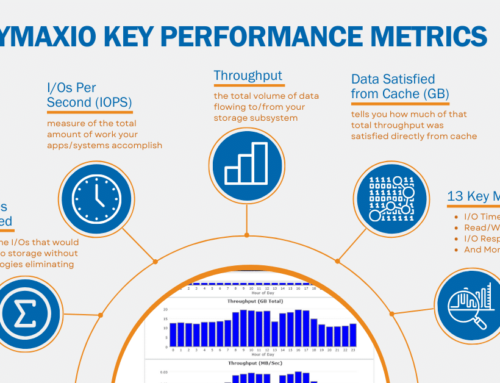Do SSDs Degrade Over Time?
You bought SSDs to increase your system performance, but you noticed that the performance has degraded since you first bought them. Can SSD performance degrade over time and is there a way to prevent this? The answer is YES and YES.
The Reason for SSD Degradation
The reason for this degradation is an undesirable SSD phenomenon called the Write Amplification Factor (WAF), a dirty word for SSDs. This is a numerical value that indicates the actual amount of data that was written to an SSD in relation to the amount of data that was requested to be written from the Host (i.e. Windows OS System)
data written to the SSD
WAF = ——————————
data written by the host
For example, an application on the Windows Server system writes out 128kb of data to the SSD, but internally on the SSD, 512kb of data had to be written on the SSD for this to occur. This will degrade SSD write performance.
In this example, the WAF = 512kb/128kb = 4 ! This is bad, a 128kb write from the host
! resulted in 512kb of internal writes on the SSD
Ideally, you want a WAF = 128KB/128KB = 1 ! This is the best case, a 128kb write from the host
! resulted in 128kb of internal writes on the SSD
Now, why does this occur? Unlike HDDs, data cannot be directly overwritten on a disk. On SSDs, data can only be written to erased spaces. When you have a brand new initialized SSD, all the pages are in a free/erased state, so no problem in finding free/erased spaces to write new data. But as the SSD starts to fill up with data, resulting in erased spaces having to be created which causes the WAF to increase. I can go into more detail on this but will save it for another time. Suffice to say, a higher WAF value means SSD performance degradation.
Now that you know the restrictions of writing to an SSD, let us get to the real questions.
Do SSDs degrade over time?
The answer is YES but it has to do more with the SSDs filling up over time. I have seen recommendations on the web to keep free space on SSDs anywhere from 10% to 30% to avoid this degradation. With less free space on a highly I/O intensive system, a couple of things occur:
- There are less free spaces to write to so some extra overhead may have to occur, like block erasures, to allow the new updates to occur. This increases the WAF – Not a good thing.
- With less free space, file data may get spread out to different locations on the SSD. For example, in the best case, 10 pages of file data that is being updated are all on the same block. If the block needs to be erased to be updated, then just that one block needs to be updated. But if those 10 pages are on 10 different blocks, then in the worst case, those 10 blocks have to be erased and re-written – More overhead and a higher WAF.
Some SSD technology has been introduced to help with this but did not fully eliminate the problem.
- SSDs are overprovisioned. For example, a 1TB SSD actually contains 1.1TB of data space. This extra space (seen only by the SSD internals) helps to allow the WAF to remain low.
- SSD Garbage collection and Trim. Both of these processes include freeing/erasing spaces in the background so new writes can occur quickly on these newly erased spaces.
Can DymaxIO® help with SSDs Degrading?
The answer is YES. DymaxIO has the technology to keep the WAF low which is a good thing!
- The patented IntelliWrite® technology enforces efficient Sequential Writes to occur rather than smaller Random Writes from the Windows Host. Sequential writes are more likely to place data in the same blocks which can decrease the WAF – A good effect, where Random Writes does the opposite and can increase the WAF – a bad effect.
- Optimization engines keep the free space contiguous when needed on the host logical side. This will help enforce larger sequential writes to occur which decrease the WAF – a good effect
- There are also a few more benefits of enforcing larger sequential writes.
- Sequential I/Os outperform Random I/Os on storage, both HDDs and SSDs, so this ensures you are getting the optimal performance from your storage.
Keeping the WAF low and less writes on the SSD can help to extend the lifetime of the SSD.
Keep your SSDs running like new
To further back up the above, there are many references on the web that discuss how these factors affect SSD performance. So, to keep your SSDs running like new:
- Keep sufficient contiguous logical free space to enforce Sequential Writes to your SSDs
- Enforce Sequential Writes rather than Random Writes.
The technology in DymaxIO does both of these functions automatically.
Download a free 30-day trial of DymaxIO.
Looking for more on SSDs? Read Part 2 HERE.





[…] main disadvantage of an SSD is how fast it expires. Every time data is removed from an SSD, its cells decay. This makes an SSD last much lower than an […]
[…] Your perceived hard disk drive speed will reduce over time due to the operating system taking more time to write and read data over time. An SSD degrades due to a phenomenon known as write amplification. […]
Diskeeper always corrupts windows files when i intall. always after the installation i need to use the sfc /scannow to fix.
I use Windows 10 Enterprise 2016 LTSB – x64
Hi Ryan,
This is strange as I have not heard this reported to us before. We use the Windows ‘API’ to do the actual data movement for defragmenting, so we are just running at user-mode level for defragmentation, so it is supposed to take care of safe data movements. I would suggest submitting a support case on it so it can be investigated.
Gary
I see this too !
Diskeeper / v-locity keep my HDD thrashing .. try to run chkdsk without and with intellimemory and see how this caching increase disk reading instead of decreasing it .
Hi Sabre,
That is great to hear! Thanks for letting us know.
Kellie
Great information. Thank you guys for updating us tech users with such helpful knowledge!
Just 3 months ago I finally was able to build a new PC bringing my system into this decades tech. Now that I can make use of PCIE 4th gen and NVME SSD’s I was looking for a way to optimize my information storage. My goal is to maintain all parts of my system for increased performance while adding to the useful life of my hardware. I will be downloading the Diskeeper trial as soon as I finish this comment. I’m not sure though, would Diskeeper help my desktop? If not I’ll still try it out on my older but reliable Poweredge server.
Thanks again. I’ll be reading much more of this companies Blog post.
Hi Brent,
Yes, you can use Diskeeper on your laptop. Let us know how the trial goes and if you need anything, please reach out.
Thanks,
Kellie
I’m a user of Diskeeper 10 Home. I’ve been deterred from upgrading to a current version by your inexplicable removal of support for external drives. My internal drive is an SSD, my external drive is an 4 TB HDD.
1) Will my older copy of Diskeeper provide the service for my internal SSD that you describe in this article?
2) Why won’t you restore service for external drives? They need the service as much or more than do internal drives, being larger and more likely to be HDDs, and removal of support for them has kept me from upgrading to a current version of your product.
Phil – Thanks for being a long-time Diskeeper user. Unfortunately, Diskeeper 10 (released back in 2005) does not have the SSD optimization technologies in it. With some of the latest technical advances in external drives, we are now re-evaluating the support for them.
Gary
A more accurate description is that SSD performance degrades over time. HDD degrade as the magnetic domains become less apt to change magnetic poles, bearings and rotating components age, and overall mechanically wear out. SSDs avoid the mechanical wear out. The old method of marking a sector as “bad” for HDD (with its subsequent loss of storage space) was means to work-around mechanical wear. HDD fragmentation was also real issue with performance degrading. NTFS and FAT method to store data on HDD contributed to fragmentation. Years ago, I found that Diskeeper really helped overcome the fragmentation issue.
Example, some members of our business office had a large spreadsheet which they frequently sorted restored on the HDD. Each PC had a copy of the same file which was updated via queries to a central repository. One day I was called to account for why one PC was so much slower than another performing a sort on the file. Both PCs had a copy of the same file which was updated via queries to a central repository. PC1 completed the sort in about 2 minutes, PC2 required about 15 minutes. After using Diskeeper to defragment the data drive on PC2, the sort completed in about 1-1/2 minutes. It was amazing. Just improving the speed of the data sort regained 1 man-hour per week for each person in the office.
Now, data drives (either HDD or SSD) have over 1000 times the capacity of what we were using for data drives back then. While I have not seen concrete numbers, I do know that HDD with NTFS5 still fragment. The built-in Windows defragmentation may be useful, but is a very light-weight The description of increasing WAF on SSD helps explain similar “fragmentation” of the SSD with subsequent performance degradation. It does not matter if the system is using EXT4 or XFS (Linux), there is still performance degradation over time, although I have seen invalid claims that EXT4 or XFS don’t fragment.
Even data in cache can display performance degradation due to FIFO and the number of memory cycles required between write and when the data can be read. However, that is another issue from storage. Unfortunately, even with large cache, the size of many data components requires using storage components (SSD, HDD, etc.) for a lot of “in use data” Use of SSD (or high speed SAS) starts to bring the access speed down, but subsequent rewrites and fragmentation degrade that performance.
Bottom line: It may seem less expensive to purchase low cost, large capacity SATA drives (there are a lot out there) and not purchase performance improvement products (such as Diskeeper). If the performance hit over time results in the loss of one man-hour per week for each member of the staff, The lower initial cost is overcome by the costs for lost productivity.
Hi Dwight,
I will pass on your report on XBOX XVHD format.
Gary
Hi Kelly,
I do enjoy using Diskeeper but recently I have had to stop using the product because it was causing my system to crash. How you ask? Well I have signed up for Microsoft’s Xbox pass and when you download games from the Store it saves those games in a disk image format of XVHD. Diskeeper was trying to optimize these disks but cannot gain access and after many attempts crashes the system.
Can we please get the engineering guys to work on a fix?
Kind Regards,
Rowen Nortje
Hi Rowen,
I will send this information over to our Engineering team and see what they say. Keep a look out for an email from them.
Thanks,
Kellie
Hi Rowen – This is the first I have heard of this and sorry you experienced this. Now, XVHD formatted volumes are not supported by Diskeeper, but it should exit gracefully. If you have a crashdump from this, could you please submit a support case on it through our website, so it can be investigated.
Gary
[…] Part 1, I explained how SSDs can degrade over time and the reason for it was associated with an […]
Please keep us up to date on progress fixing the Diskeeper service crashing on Windows 10 (2004) problem.
Once we know there is a fix, we can reinstall it again.
Hi Paul,
Tech Support will be reaching out to you shortly.
Thanks,
Kellie
From Tech Support (they sent you an email as well)
Hi Paul,
Sorry you experienced this issue and this is the first instance we had a report on it. No one else has reported it and we could not reproduce it in-house. That said, we have heard and seen other applications stop working with the Windows 10 (2004) update and had to reinstall these other apps, but nothing with Diskeeper yet. I believe a support rep had already responded back to you on this and was waiting back for a response. He will be trying to re-connect with you again.
Thanks,
Kellie
Nice article !
BTW, Your IntelliMemory technology in our testing lab shows 2X reading from physical storage . So after the 1st read, IntelliMemory read data again from storage to put it on cache, why not just read the data from windows cache instead of reading again from storage? we are going to publish some results about i/o reduction technology to the public to let them see the real-world results and how these techniques increase disk i/o instead of decreasing it .
thanks .
Hi Jane,
Thank you for your question and very glad you are seeing some good results. You are correct that some caching methods will just take data that was just read in and put it into cache, ‘hoping’ that it will be read again. That subsequent read may not always be the case though. Also, on some systems, available memory may be a scarce commodity. IntelliMemory takes a more effective and efficient method in determining what to put into cache and what to keep in cache for the best performance with the memory that is available. It takes a longer term approach that basically looks at two factors, One – what data is getting read the most, so more likely to get performance gains from caching and two – It knows that certain patterns of data can deliver higher performance gains than others. With this, it can determine what to put and keep in cache for the best caching performance gains using what memory is available. Now to your question of ‘why not just read the data from Window’s cache’. We have found that the data may not be in Windows cache and that is why you are seeing the 2x gain with IntelliMemory.
Also, the IntelliMemory is dynamic on its use of available memory for caching. It will only use what is available, not being used and if any user or system process needs it, it automatically gives it back.
Sorry if I went a little overboard in explaining this, but appreciate you reaching out to us and please don’t hesitate if you have further questions.
Kellie for GQ
I am a user of Diskepper, please tell me how to use the diskeeper to keep the good performance of SSD?
Hi Thomas,
Thank you for reaching back to us and thank you for being a Diskeeper user. The latest versions of Diskeeper will automatically determine if the storage is a HDD or a SSD and apply the correct methods to optimize it, so you should be good. For much, much older SSDs where it may not recognize that it is an SSD, Diskeeper settings allow you to override the detection and set the type as a HDD or SSD.
Kellie for GQ
I did not install Diskeeper onto my computer with SSD primary drive until about six months after I bought the computer. The product is now on and operating, but, will it affect in any way, or correct in any way, these issues you discuss with my SSD for anything that I had done prior to the install? Will the software go back to the SSD and reorganize and optimize the data on the drive?
Hi Larry,
Thank you for reaching back to us and good question. Diskeeper will go back and optimize if needed, so you are good. Diskeeper will automatically determine if the storage is a HDD or SSD and apply the appropriate optimization methods. For example, fragmented files on SSDs do not effect read performance like it does on HDDs, so unless a file is really fragmented (I think it was > 128 fragments), we will leave it alone and not cause any extra writes to the SSD. Over the limit though, we have found a performance degradation from the fragmentation, but not from the SSD storage itself, but the fact that so many extra I/O must be processed to read the data, so in that case Diskeeper will optimize the file. I hope this helps and thanks for being a Diskeeper customer.
Kellie for GQ
Very helpful and thank you. Also, on my machine, because I was concerned about the read/write cycle life of the SSD I installed a secondary HDD and mapped all my documents folder, desktop, other storage folders to that drive to minimize wear and tear on the SSD. Hopefully that all serves me for many a year to come! I also bought commercial grade SSD and HDD and not the standard consumer grade and hope that helps as well. Have a nice day.
Interesting
Hi Sylvain,
Glad you found the post interesting. Gary has a way to make the technical stuff easy to read. Let us know if you have any questions.
Kellie
Sounds Good….I’ll give it a try!
Hi Michael,
Let us know if we can help with anything.
Kellie
I have ssd keeper that I purchased from you, dorsn’t it have the same technology as diskeeper and vlocity? I am pleased with the performance and after using it for over a year, I really have not noticed any drop off in speed.
Hi John,
Thanks for being a loyal customer! There are some differences although the performance result is the same.
That’s great! We love to hear customer’s performance gains.
Kellie
I am already an user of Diskeeper. Unfortunately Diskeeper only optimizes internal HD and SSD drives. I also have an external SSD drive connected via USB and unfortunately Diskeeper cannot act on this SSD. Hopefully you will have a future update of Diskeeper that can act and optimize externally connected SSD’s via USB.
Hi Kin,
Thanks for being a loyal customer! I will let our engineering team know.
Have a great week.
Kellie
Hi Kellie, I to am a user of Diskeeper on all my computers and also have the same problem on my 3 external SSD USB devices. I do a lot of lightroom work on the SSDs.
Additional note-My internal SSDs haven’t shown any noticeable slowdown over the last 3 years.
This was a helpful article, even though I don’t use SSDs.
Hi Roger,
I’m glad you found it helpful! Stick around, we will have some other great posts soon.
Kellie